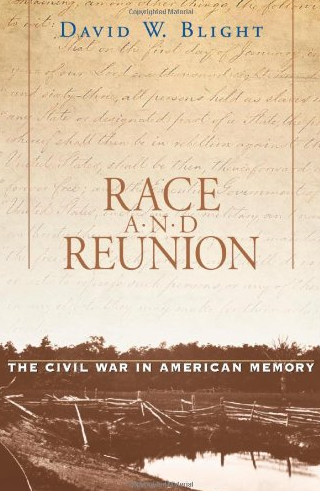I Disagree With Some of the Best Books Ever
A former student recently asked me to comment on David W. Blight's Race and Reunion. I said it was a great book...but one with which I disagree. And I talk about disagreeing with it all the time. Perhaps a little explanation is in order... But first, I would like to say that this is an important work in the field of Civil War memory - maybe the most important (at least right now). It is beautifully written and about as captivating as a history book can be. I just think that Blight has missed his mark. Here is my thinking on what I term Blight's (and others') "reconciliation premise" - paraphrased from my book, Across the Bloody Chasm, on the subject of veterans, commemoration, and national reconciliation.
Blight, while curiously overlooking northern efforts to commemorate the fight to preserve the Union, examines how participants at events geared toward reconciliation, such as the 50th anniversary reunion at Gettysburg in 1913, ignored the principal issues leading to war and the Union war aim of emancipation. At these events, mentions of slavery or emancipation were conspicuously absent. Blight reasons, together with white supremacists, reconciliationists “locked arms” and “delivered a segregated memory of the Civil War on Southern terms.” He concludes, “Forces of reconciliation overwhelmed the emancipationist vision in the national culture [and] the inexorable drive for reunion both used and trumped race.”
Scholars can and should agree that Civil War veterans from both North and South shared in their racist sensibilities; they can likewise condemn them for their actions. But while the participants were undoubtedly racist, emphasizing veterans’ reconciliatory impulses solely as efforts to commemorate a “white only” war runs the risk of obscuring veterans’ intentions. Did veterans calculatingly contribute to historical amnesia along racial lines in the name of reconciliation? There is relatively little evidence pointing to this conclusion. It is true that from the point of view of most veterans, reconciliation seemed the soundest course of action. Yet the memories that informed the terms of reconciliation suggest that Civil War veterans acquiesced to reaching across the bloody chasm (see what I did there?) only so long as their former enemies accepted their respective arguments – a scenario that seldom transpired.
Even a cursory look at the historical record reveals that the memories of slavery, emancipation, and the trials of freedmen coupled with other contentious issues such as treason and the right of secession loomed large for former soldiers from both North and South. In fact, questions concerning race functioned as a leitmotif throughout the reconciliation era. Whether veterans celebrated the demise of slavery and saw emancipation as a worthy component of their cause, or viewed slavery as an incident rather than a cause of the war, race and the plight of black Americans functioned as a central narrative in the battle to write the terms of reconciliation.
Evidence suggests (and I have examples to spare – just ask) that Blight’s efforts to illustrate the memory of the war as a “white only” “southern terms” affair miss the bull’s-eye by a Confederate mile. The terms of reconciliation were – and still are for that matter – undecided, hashed out, and fought over...on a national scale. Slavery, emancipation, and black people in general were central to this post-war conflict over memory. Neither Union nor Confederate veterans let the citizens of a reunited nation forget their positions on this volatile subject – a subject that has remained among the most divisive generations after the conflict. But as always - I suggest you read Race and Reunion and judge for yourself.
With compliments,
Keith
